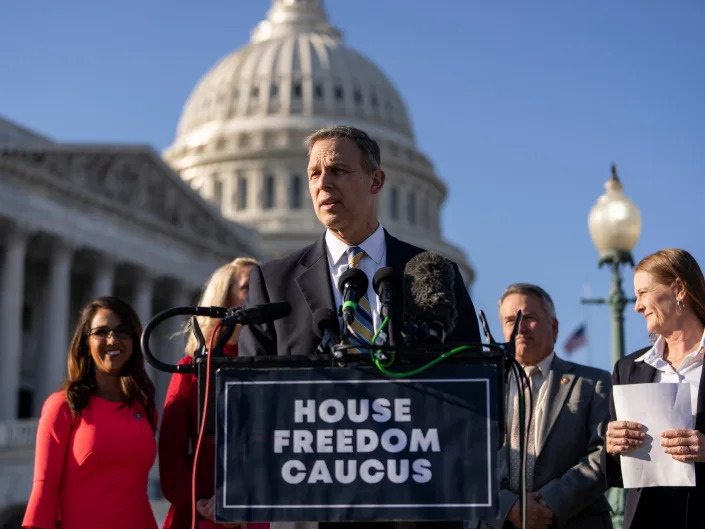

Armed police officers gather near the scene of a shooting in Hamburg, Germany on Thursday March 9, 2023. Shots were fired inside a building used by Jehovah's Witnesses in the northern German city of Hamburg on Thursday evening, and an unspecified number of people were killed or wounded, police said.
(Daniel Bockwoldt/dpa via AP)
DEEPA BHARATH
Thu, March 9, 2023
Several people were killed and injured Thursday night after shots were fired inside a building where Jehovah’s Witnesses met in the northern German city of Hamburg, officials said.
The international Christian denomination founded in the United States has a more than 100-year history in Germany. Today, about 170,000 members call the European country home, according to the denomination’s website.
The denomination itself dates back to the 19th century. It was founded by Charles Taze Russell, a minister from Pittsburgh. Now headquartered in Warwick, New York, it claims a worldwide membership of about 8.7 million. Members are known for their evangelistic efforts including knocking on doors and distributing literature in public squares.
Here is a quick look at the international denomination’s beliefs and their history in Germany:
— In Germany, there are about 2,020 Jehovah’s Witness congregations and 170,491 ministers. One in 498 Germans practice the faith, according to the denomination’s website.
— Jehovah’s Witnesses do not call their place of worship a church, but “Kingdom Hall.” This is because they believe the Bible refers to worshippers -- not the building -- as the church. The building or hall where congregants meet to worship Jehovah (the God of the Bible and His Kingdom) is therefore known as “Kingdom Hall of Jehovah’s Witnesses.
— Jehovah’s Witnesses do not use the cross in worship because they believe the Bible indicates that Jesus did not die on a cross, but on a simple stake, and that the Bible “strongly warns Christians to flee from idolatry, which would mean not using the cross in worship,” the denomination's website states.
— Each congregation is supervised by a body of elders. About 20 congregations make up a circuit and are occasionally visited by traveling elders known as circuit overseers.
— On January 27, 2021, the German State Parliament commemorated the Jehovah’s Witnesses’ courageous stand against Nazi abuse. Because of the coronavirus pandemic, the ceremony was hosted online and was viewed by more than 37,000 people from Austria, Germany, the Netherlands and Switzerland.
— About 1,500 Jehovah’s Witnesses died during the Holocaust out of about 35,000 who lived in Germany and Nazi-occupied countries at the time. More than 1,000 died in prisons and concentration camps. Members of the faith were persecuted by the Nazi regime because they remained politically neutral. They also refused to sign a document renouncing their beliefs and disobeyed the regime’s orders by continuing to meet for worship, doing public ministry and showing kindness to Jewish people.
— On Jan. 27, 2017, Jehovah’s Witnesses received the same legal status that is granted to major religions in Germany, which meant they are viewed as a single religious entity. Prior to gaining this status, their national headquarters in Germany and thousands of congregations in the country were considered independent religious associations.
— In the U.S., Jehovah’s Witnesses suspended door-knocking in the early days of the pandemic’s onset, just as much of the rest of society went into lockdown too. The organization also ended all public meetings at its 13,000 congregations nationwide and canceled 5,600 annual gatherings worldwide — an unprecedented move not taken even during the Spanish Flu pandemic in 1918, which killed 50 million people worldwide.
___
Associated Press religion coverage receives support through the AP’s collaboration with The Conversation US, with funding from Lilly Endowment Inc. The AP is solely responsible for this content.
DEEPA BHARATH
Thu, March 9, 2023
Several people were killed and injured Thursday night after shots were fired inside a building where Jehovah’s Witnesses met in the northern German city of Hamburg, officials said.
The international Christian denomination founded in the United States has a more than 100-year history in Germany. Today, about 170,000 members call the European country home, according to the denomination’s website.
The denomination itself dates back to the 19th century. It was founded by Charles Taze Russell, a minister from Pittsburgh. Now headquartered in Warwick, New York, it claims a worldwide membership of about 8.7 million. Members are known for their evangelistic efforts including knocking on doors and distributing literature in public squares.
Here is a quick look at the international denomination’s beliefs and their history in Germany:
— In Germany, there are about 2,020 Jehovah’s Witness congregations and 170,491 ministers. One in 498 Germans practice the faith, according to the denomination’s website.
— Jehovah’s Witnesses do not call their place of worship a church, but “Kingdom Hall.” This is because they believe the Bible refers to worshippers -- not the building -- as the church. The building or hall where congregants meet to worship Jehovah (the God of the Bible and His Kingdom) is therefore known as “Kingdom Hall of Jehovah’s Witnesses.
— Jehovah’s Witnesses do not use the cross in worship because they believe the Bible indicates that Jesus did not die on a cross, but on a simple stake, and that the Bible “strongly warns Christians to flee from idolatry, which would mean not using the cross in worship,” the denomination's website states.
— Each congregation is supervised by a body of elders. About 20 congregations make up a circuit and are occasionally visited by traveling elders known as circuit overseers.
— On January 27, 2021, the German State Parliament commemorated the Jehovah’s Witnesses’ courageous stand against Nazi abuse. Because of the coronavirus pandemic, the ceremony was hosted online and was viewed by more than 37,000 people from Austria, Germany, the Netherlands and Switzerland.
— About 1,500 Jehovah’s Witnesses died during the Holocaust out of about 35,000 who lived in Germany and Nazi-occupied countries at the time. More than 1,000 died in prisons and concentration camps. Members of the faith were persecuted by the Nazi regime because they remained politically neutral. They also refused to sign a document renouncing their beliefs and disobeyed the regime’s orders by continuing to meet for worship, doing public ministry and showing kindness to Jewish people.
— On Jan. 27, 2017, Jehovah’s Witnesses received the same legal status that is granted to major religions in Germany, which meant they are viewed as a single religious entity. Prior to gaining this status, their national headquarters in Germany and thousands of congregations in the country were considered independent religious associations.
— In the U.S., Jehovah’s Witnesses suspended door-knocking in the early days of the pandemic’s onset, just as much of the rest of society went into lockdown too. The organization also ended all public meetings at its 13,000 congregations nationwide and canceled 5,600 annual gatherings worldwide — an unprecedented move not taken even during the Spanish Flu pandemic in 1918, which killed 50 million people worldwide.
___
Associated Press religion coverage receives support through the AP’s collaboration with The Conversation US, with funding from Lilly Endowment Inc. The AP is solely responsible for this content.
















